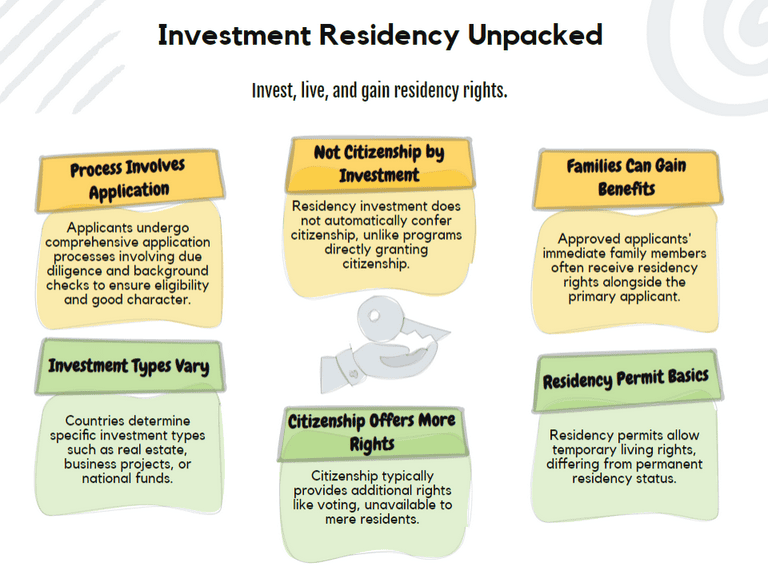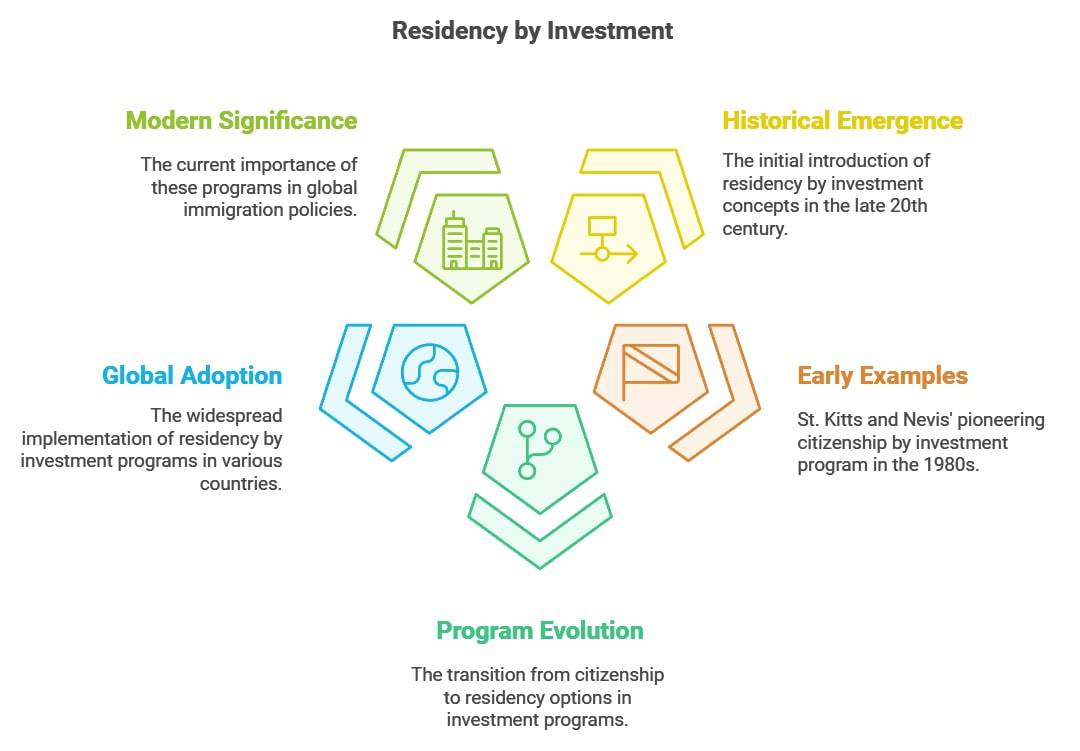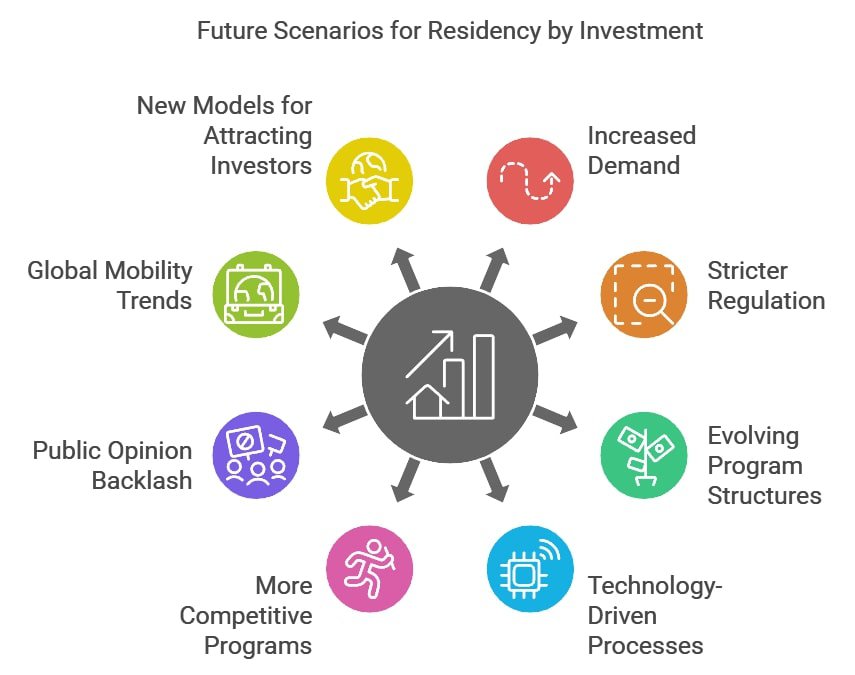Residency By Investment Explained
Boost Your Freedom Without Compromise.
- Who offers the CHEAPEST program available.
- Who offers the BEST program available.
- What you need to qualify?

- Residency by Investment programs offer individuals the opportunity to obtain residency in a foreign country through significant financial investments, such as purchasing real estate, making a capital investment, or creating jobs.
- These programs differ from Citizenship by Investment programs primarily in that they offer residency first, with a potential path to citizenship after meeting certain conditions over time.
- Common investment options include real estate purchases, government bonds, and national development fund contributions, with the aim of boosting the host country's economy.
- Benefits include the right to live, work, and study in the host country, access to healthcare and education, and, in some cases, visa-free travel within certain areas like the Schengen Zone.
- Tax implications can vary, with new residents potentially subject to tax on worldwide income, necessitating careful financial and tax planning.
In the age of globalization, having the flexibility to live and work in multiple countries has become increasingly valuable.
One pathway to this flexibility is through residency by investment (RBI) programs.
But what exactly does this concept entail?
Our expert WorldPassports team put together a summary of all you need to know to get the answers you need.
In This Article, You Will Discover:
Whether you're a seasoned global investor or just starting your journey towards international residency, this guide has been created to equip you with the knowledge you need to make informed decisions.
Let's embark on this exciting journey of understanding residency by investment...
- Who offers the CHEAPEST program available.
- Who offers the BEST program available.
- What you need to qualify?
 Free Consultation
Free Consultation Easy to Use
Easy to Use 100% Safe & Secure
100% Safe & Secure
Understanding Residency by Investment
Residency by investment is a concept that’s becoming increasingly popular across the globe, offering individuals the chance to legally acquire a new residency (and, potentially, citizenship) by investing in the economy of a host country.
The concept has various nuances that potential applicants should be aware of and understand, so we've collated the top questions and answers on this topic.

Have a look.
What’s Residency by Investment, & How Does It Work?
Residency by investment is an initiative employed by many countries, in which foreign nationals can make a significant financial investment in a country in exchange for the right to live, work, and study in that country.
The specifics of these programs can vary widely by country in terms of the investment amount, type of investment, processing time, and benefits offered.
What’s more
The process usually involves a comprehensive application process, including due diligence and background checks to ensure the applicant is of good character.
Once the application is approved and the investment is made, the applicant, and sometimes their immediate family members, are granted residency rights in that country.
Is Residency by Investment the Same as Citizenship by Investment?
No, residency by investment and citizenship by investment programs aren’t the same thing.
While the 2 programs are similar in that they both require a significant financial investment in a country in exchange for immigration benefits, there are key differences.
Residency by investment grants an individual the right to live in a country, typically with the ability to work and study there as well. It's usually the first step towards citizenship, but it doesn’t confer citizenship on its own.
On the other hand
Citizenship by investment is a much more direct route to acquiring citizenship in a foreign country, as these programs offer immediate citizenship and a passport upon making a substantial investment.
The main advantage here is that citizens often enjoy additional benefits not available to residents, such as the right to vote and greater travel freedom.
Is a Residency Permit the Same Thing as Permanent Residency?
No, a residency permit isn't the same thing as a permanent residency, as they’re 2 different immigration statuses, each with its own rights and privileges.
A residency permit - often granted as part of a residency by investment program - typically gives an individual the right to live, work, and study in a country for a certain period, which can often be extended.
On the flip side
Permanent residency is a more permanent immigration status that allows a foreign national to live and work indefinitely in a country.
Permanent residents often have more rights and benefits compared to temporary residents, such as access to certain social services.
However, a permanent resident still isn't a citizen and thus doesn’t have all the rights of a citizen, such as the right to vote.
What’s the History of Residency by Investment?
Residency by investment has a prolific history, and we’d like to share the key milestones with you.

Here are the main historical milestones our team has noted:
- The concept of residency by investment first emerged in the late 20th century as countries started to recognize the economic potential of attracting foreign investment through immigration programs.
- One of the earliest examples can be traced back to the 1980s, when St. Kitts and Nevis introduced its citizenship by investment program to attract foreign capital.1 This was followed by similar programs in other countries.
- Over the years, these programs have evolved, providing options for residency in addition to citizenship.
- Many developed and developing countries now offer such residency programs, including the United States, Canada, Portugal, Spain, and Malta. Each has its own unique requirements and benefits, designed to align with the country's economic and demographic goals.
- The popularity of residency by investment programs has surged in the 21st century, driven by globalization, increased mobility, and the desire of individuals for greater security, better opportunities, and improved quality of life.2
- Today, residency by investment programs represent a significant component of immigration policies in many countries worldwide.
Read On: Portugal's Residency by Investment Program
Why Would I Want to Consider Residency by Investment?
You’d want to consider residency by investment as it offers multiple benefits that may be attractive depending on your personal, financial, and lifestyle objectives.
Here are some key reasons why you might consider it:
- Greater mobility: Having permanent residency in another country often gives you visa-free or visa-on-arrival access to numerous countries, enhancing global mobility.
- Economic opportunities: Residency may open up new business and investment opportunities in the host country.
- Improved quality of life: It might provide access to better healthcare, education, safety, and quality of life for you and your family.
- Tax efficiency: Some countries offer tax advantages to foreign investors, which can make residency by investment financially attractive.
- Security: Residency can serve as a safety net in times of political, economic, or social instability in your home country.
- Pathway to citizenship: In some cases, residency by investment can lead to full citizenship after a certain period, further expanding your rights and benefits.
Why Would Countries Offer Residency by Investment?
There are several reasons why countries offer residency by investment programs, and those reasons are primarily driven by economic considerations.
Our expert team compiled the top reasons for you:
- Attract foreign investment: These programs are designed to encourage foreign capital inflow into the host country, stimulating economic growth and development.
- Boost property market: They often result in investments in real estate, aiding the growth and sustainability of the country's property market.
- Create jobs: Investments made can lead to job creation, enhancing the local labor market.3
- Drive tourism: Investors and their families may become frequent visitors, driving tourism and related industries.
- Stimulate local economy: Investments often trickle down to various sectors of the economy, promoting overall economic activity and growth.
What Does the Future of Residency by Investment Look Like?
Predicting the future of residency by investment is hard, but what we do know is that it involves a number of factors, including economic, political, societal, and technological trends.

Here are a few potential scenarios to consider:
- Increased demand: Economic instability and political challenges in certain parts of the world may drive demand for residency and citizenship by investment programs.
- Stricter regulation: As these programs increase in popularity, they may also become more closely scrutinized by international regulatory bodies, which could lead to stricter regulations.
- Evolution in program structure: The structure of these programs might shift towards encouraging more sustainable and socially beneficial investments. Countries may want to attract investments that contribute to their green economy, technological innovation, or social housing projects.
- Technology-driven processes: Technological advancements could streamline the application and verification processes, making it quicker and easier for individuals to apply for and receive residency.
- More competitive programs: As more countries begin to see the potential economic benefits of these programs, the marketplace could become more competitive. Countries might offer additional incentives, such as tax breaks or business support services, to attract high-value investors.
- Public opinion and backlash: As RBI programs grow and evolve, locals might feel that their interests are being overlooked in favor of foreign investors. This could force a reevaluation of the programs and potentially lead to restrictions or reforms.
- Global mobility and remote work trends: The shift towards remote work that has been accelerated by the COVID-19 pandemic may influence RBI programs, as more people may seek to become "global citizens". RBI programs could adapt to meet these new demands, perhaps by offering specific incentives for digital nomads.
Isobel Neilson, a senior manager at global immigration law firm Fragomen, is of the opinion that programs such as residency by investment will have to start looking at new models to attract new investors.4
These new models could allow applicants to use other means to illustrate their commitment to a country, be it by using their talents and expertise or by creating jobs.
Common Questions
Is Residency by Investment the Same Thing as a Golden Visa?
Can I Get Residency in the Netherlands?
What Are the Restrictions on Residency by Investment?
Will Residency by Investment Lead to Citizenship?
What Can I Do With Permanent Residency?
What Are the Alternatives to Residency by Investment?
In Conclusion
Residency by investment opens a world of opportunities, enabling individuals to enjoy increased mobility, a better quality of life, stronger economic stability, and a wealth of cultural experiences.
They aren’t just investment opportunities but gateways to exploring a wider horizon of lifestyle, business, and personal growth.
Our research shows that these programs are as diverse as the countries that offer them, each with its own unique benefits and considerations.
While this journey can seem complex, armed with the right information, it becomes an exciting venture toward world citizenship.
Whether you're seeking new markets, better education, or simply the joy of being immersed in a different culture, residency by investment can be your ticket to achieving these dreams, so be sure to equip yourself with all you need to know on this site.
- Who offers the CHEAPEST program available.
- Who offers the BEST program available.
- What you need to qualify?
 Free Consultation
Free Consultation Easy to Use
Easy to Use 100% Safe & Secure
100% Safe & Secure







